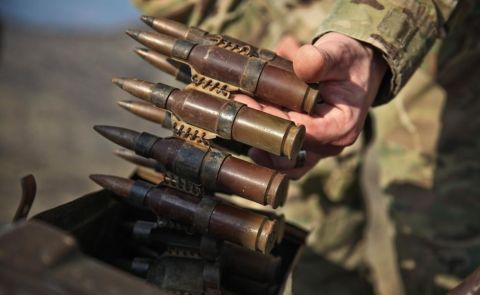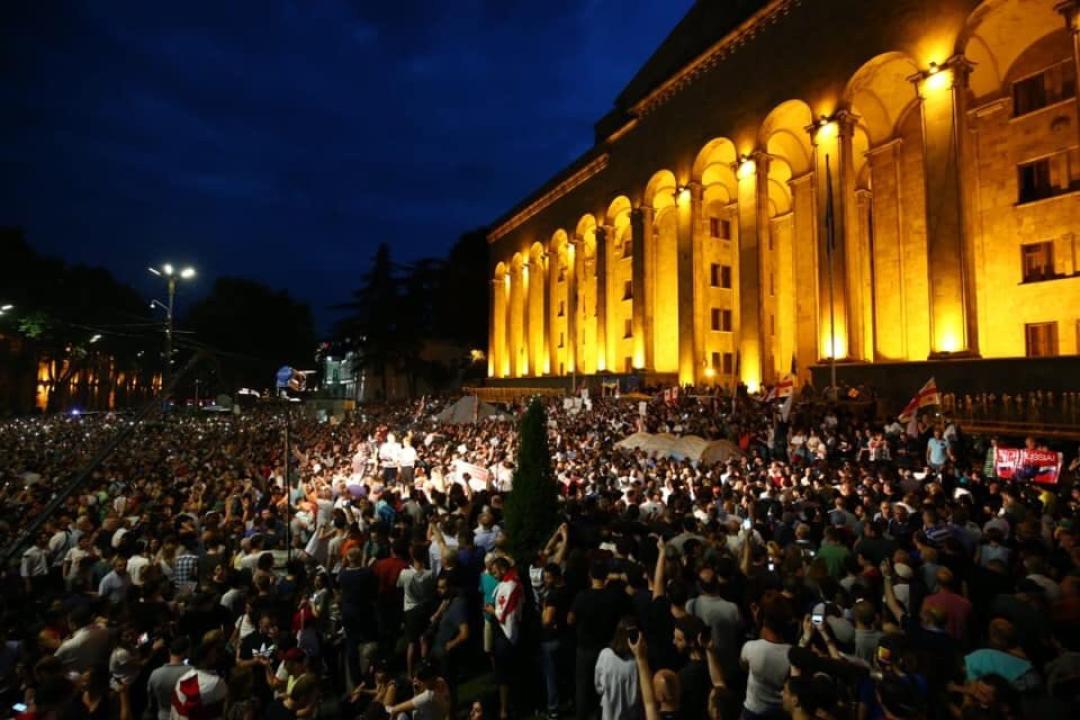
Mass protests break out in Georgia after provocation by Russian lawmaker

On 20 June, mass protests started in Georgia when Sergey Gavrilov, a member of the Russian Duma from the Communist Party, addressed the delegates in Russian from the Georgian Parliament Speaker’s seat at the Inter-parliamentary Assembly on Orthodoxy (IAO).
The European Georgia and United National Movement were the first to boycott the Russian delegation’s presence in Tbilisi, but were afterwards joined by other non-parliamentary groups, anti-occupation activists and Georgian citizens. The protesters criticized the Georgian government for allowing Gavrilov into the country “as he fought and killed Georgians” during the armed conflict in Georgia’s Russian-occupied Abkhazia region in 1991. The members of the United National Movement opposition even said that the government had a one hour ultimatum to dismiss Parliament Speaker Irakli Kobakhidze, Minister of Internal Affairs Giorgi Gakharia and head of the State Security Service Vakhtang Gomelauri for letting a member of the Russian parliament into Georgia and into the parliament.
The members of the government including Georgian Dream Chairperson Bidzina Ivanishvili, Prime Minister Mamuka Bakhtadze, and Parliament Speaker Irakli Kobakhidze also condemned the visit of the Russian delegation, assigning Gavrilov’s act of assuming the Chair of the conference to a “protocol blunder”. “We made the decision that the assembly event will not continue in the Georgian parliament building because Gavrilov, without any beforehand agreement, dared to occupy the seat of the Georgian parliament speaker to address the audience. The session should have been moderated by a Greek Secretary General of the assembly and it is unclear how Gavrilov appeared in the seat,” said one of the leaders of the Georgian Dream Mamuka Mdinaradze.
Secretary General of the Georgian Dream party and Major of Tbilisi Kakha Kaladze stated that viewing Gavrilov at the high tribune of the Georgian parliament was “alarming” and “not agreed upon”, causing protest amongst the Georgian population. “Now, we [people] should not act in a way that strains the situation further and allows the enemy to use the situation for its interests,” he said. “The Russian delegation will leave Georgia. Naturally, the conference will not and cannot continue in that manner,” he stated, and noted that Georgia, which “is a respected member of the Orthodox world for 17 centuries” is “using every possible platform for the de-occupation of our country and for the promotion of the interests of our country.”
The Prime Minister Mamuka Bakhtadze also revealed his discontent with the unfolding situation. He stated that it was very difficult for him to see a member of the Russian Duma to speak from the seat of the Georgian parliamentary chair. He said that the fact affected national interests and the Georgian parliament. “I fully support the protest of the Georgian people regarding the incident and appeal to the organisers to explain the reasons and take appropriate action,” Bakhtadze wrote.
The Georgian President Salome Zourabichvili wrote on her Facebook page that Russia uses religion for political gains. “What religious connection and relations can there be with a country which occupies our, and not only our, territories, fights with religion and all Christian traditions! The country which does not allow the Georgian Orthodox population to see the graves of their parents and pray in churches,” stood in Zourabichvili’s post.
The Georgian Ministry of Foreign Affairs also supported the protests. The Georgian Foreign Ministry official Vladimir Konstantinidi said that the Foreign Ministry agreed with the ‘fair’ public protest regarding the Russian MPs’ visit to Georgia, stating that the Foreign Ministry permanently raises the issue of the occupation of two of the country’s regions as this is a key priority for the agency.
The negative reaction did not only come from the Georgian officials, but from other member countries of the IAO as well. The Ukrainian Ambassador to Georgia Ihor Dolhov temporarily left the Interparliamentary Assembly on Orthodoxy in protest when the member of the Russian parliament Sergey Gavrilov was addressing the audience in Tbilisi. Dolhov later told the journalists that he refused to listen to the Russian MP as the Russian Federation continues to occupy Ukraine and Georgia.
The Russian Ministry of Foreign affairs responded to the incident, stating that Gavrilov had to leave the Georgian parliament building “when radicals seized it” (referring to the Georgian opposition). The Russian Parliament also reacted, stating that before the incident took place “fake news” were spread that Gavrilov was fighting in Georgia’s Russian-occupied Abkhazia region in 1990s. “Gavrilov denied all the accusations of his participation, as he never participated in any military conflicts, and noted that Russia and Georgia are united by fraternal Orthodox ties,” read the official statement of the Russian parliament.
Gavrilov himself claimed that “radicals” in the Parliament of Georgia doused him in water and attempted to forcefully take his papers, but that he remained calm in spite of the incident. “I do not feel any discomfort, I am very happy to be in my homeland. The Parliament of Georgia has invited me. The subject of holding the session of the Interparliamentary Assembly on Orthodoxy in Tbilisi was discussed for two years. We believe that Georgia is well prepared. Our goal is to try to find opportunities for dialogue. The main issues are related to humanitarian and economic co-operation as well as culture, and education-related topics. During the last year, the trade turnover and number of tourists increased, but we lack humanitarian cooperation. The basis for this kind of cooperation, as Patriarch Ilia II said, is Orthodoxy and Orthodox values,” he said. Russian Parliament Speaker Volodin criticized the Georgian government for failing to neither guarantee the conduct of the event nor the safety of the Russian delegation.
The scandal in regards to the Russian deputy in the Georgian parliament resulted in violent street protests in Tbilisi. The angry demonstrators have tried to storm the parliament building. They demanded the resignation of Parliament President Irakli Kobakhidze (who was on an official visit to Azerbaijan at the time of the incident and had to cancel his trip because of the outbreak of the domestic crisis) and Interior Minister Georgi Gakharia. The Home Secretary agreed to resign “if necessary”. Initially, Irakli Kobakhidze did not want to respond to the demands for his resignation. Yet, on 21 June he resigned after a crisis session of the governing party. He will be replaced by another party member, Archil Tagavadze. During the protests there were serious clashes with the police. The police used tear gas, rubber bullets and water cannons against protesters, some of whom were armed with truncheons. Georgian ex-president Saakashvili, who is currently in Ukraine, called on Georgians to “drive out the oligarch Bidzina Ivanishvili”. Georgian Prime Minister Mamuka Bakhtadze accused the ex-president of destabilizing the situation in Georgia in an attempt to “usurp” power. According to the Georgian Ministry of Health, 160 demonstrators, 32 journalists and 80 police officers were injured in the clashes. Two demonstrators suffered severe eye injuries after they were shot with rubber bullets.
The US and UK embassies called on all parties to calm down. The German ambassador, Hubert Knirsch, expressed his concerns and called for a de-escalation of the situation. The Georgian Orthodox Church defended the protest, but at the same time distanced itself from the violence exerted by the demonstrators. "It was the fault of the government that led to a fair and peaceful protest in public. False appeals, however, have changed the nature of the rally, made it dangerous, and encouraged people to violently occupy the parliament building,"said the Patriarchate. The Georgian church believes that the government must "urgently investigate" the causes of the tensions, while state agencies, experts and the media must provide unprejudiced assessments of what is happening.
The Interparliamentary Assembly on Orthodoxy (IAO) is an interparliamentary body, set up upon the initiative of the Hellenic Parliament. The fundamental principles of the IAO are expressed in the Manifesto of Participants of the Conference convened by the Hellenic Parliament in Halkidiki, Greece, on the subject: ‘Orthodoxy in the New European Reality’. According to this, Orthodoxy in its social, historical and spiritual sense constitutes a common historical cultural tradition and religious expression for approximately half of the population of Europe and thus is a cultural prerequisite in the shaping of contemporary Europe. The IAO brings together parliamentary members from Albania, Armenia, Belarus, Bulgaria, Cyprus, the Czech Republic, Estonia, Finland, Georgia, Greece, Kazakhstan, Latvia, Lithuania, Moldova, Poland, Romania, Russia, Serbia, Montenegro, Slovakia and Ukraine, as well as, groups of Members of Parliaments from: Australia, Asia, Africa and the USA.
See Also


Zakharova Discusses Record Trade, Armenia’s EU Membership Potential, and Trilateral Working Group in Russia-Armenia Relations

Armenian Government to Cease Social Payments to Able-Bodied Karabakh Displaced Persons Starting April 1

Mirzoyan’s Visit to Kazakhstan Focuses on Strengthening Bilateral Relations, Peace Agreement, and Economic Cooperation

Ramzan Kadyrov's Son Awarded Rosgvardia Medal "For Combat Distinction"

